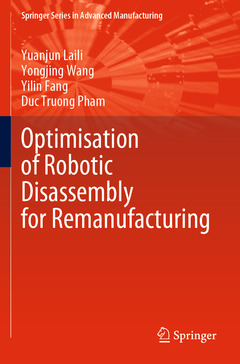Optimisation of Robotic Disassembly for Remanufacturing, 1st ed. 2022 Springer Series in Advanced Manufacturing Series

This book illustrates the main characteristics, challenges and optimisation requirements of robotic disassembly. It provides a comprehensive insight on two crucial optimisation problems in the areas of robotic disassembly through a group of unified mathematical models. The online and offline optimisation of the operational sequence to dismantle a product, for example, is represented with a list of conflicting objectives and constraints. It allows the decision maker and the robots to match the situation automatically and efficiently.
To identify a generic solution under different circumstances, classical metaheuristics that can be used for the optimisation of robotic disassembly are introduced in detail. A flexible framework is then presented to implement existing metaheuristics for sequence planning and line balancing in the circumstance of robotic disassembly.Optimisation of Robotic Disassembly for Remanufacturing provides practical case studies on typical product instances to help practitioners design efficient robotic disassembly with minimal manual operation, and offers comparisons of the state-of-the-art metaheuristics on solving the key optimisation problems. Therefore, it will be of interest to engineers, researchers, and postgraduate students in the area of remanufacturing.
A Brief Introduction on Remanufacturing.- Robotic Disassembly for Remanufacturing.- The Product Representation for Disassembly Sequence Generation.- Component and Subassembly Detection.- Modeling of Robotic Disassembly Sequence Planning.- Modeling of Robotic Disassembly Line Balancing.- Evolutionary Optimization for Robotic Disassembly.- Solutions of Robotic Disassembly Sequence Planning with Backup Actions.- Solutions of Robotic Disassembly Sequence Re-planning.- Solutions of Robotic Disassembly Line Balancing.- Solutions of Mixed Model Disassembly Line Balancing with Multi-Robotic Workstations.
Explores the issues and optimisation requirements related to the use of robotics in disassembly processes
Offers a blueprint for modelling problems in robotic disassembly and remanufacturing
Explains how optimisation and decision making tools improves the efficiency of remanufacturing
Date de parution : 08-2022
Ouvrage de 183 p.
15.5x23.5 cm
Date de parution : 08-2021
Ouvrage de 183 p.
15.5x23.5 cm
